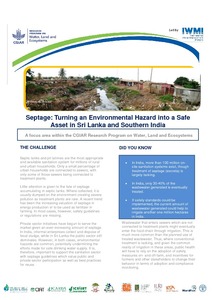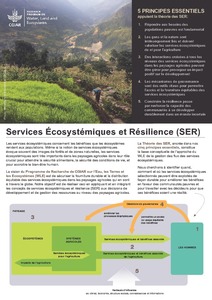Location
The International Water Management Institute (IWMI) is a non-profit, scientific research organization focusing on the sustainable use of water and land resources in developing countries. It is headquartered in Colombo, Sri Lanka, with regional offices across Asia and Africa. IWMI works in partnership with governments, civil society and the private sector to develop scalable agricultural water management solutions that have a real impact on poverty reduction, food security and ecosystem health. IWMI is a member of CGIAR, a global research partnership for a food-secure future.
IWMI’s Mission is to provide evidence-based solutions to sustainably manage water and land resources for food security, people’s livelihoods and the environment.
IWMI’s Vision, as reflected in the Strategy 2014-2018, is ‘a water-secure world’. IWMI targets water and land management challenges faced by poor communities in the developing countries, and through this contributes towards the achievement of the United Nations Millennium Development Goals (MDGs) of reducing poverty and hunger, and maintaining a sustainable environment. These are also the goals of CGIAR.
IWMI works through collaborative research with many partners in the North and South, and targets policymakers, development agencies, individual farmers and private sector organizations.
Resources
Displaying 201 - 205 of 959Review paper on ‘Garden Kits’ in Africa: lessons learned and the potential of improved water management
The purpose of this paper is to synthesize the available knowledge and lessons learned from past experiences in promoting kitchen or home gardens for food production, with a special emphasis on water management. The benefits of home gardens for better family nutrition, health status of children and mothers, and as an entry point for empowering women have been documented in some studies. However, there is very little specific evidence to confirm these benefits. The paper also reviews some of the water management practices and garden technologies used in home and market gardens.
Review of literature on chronic kidney disease of unknown etiology (CKDu) in Sri Lanka
This manuscript undertakes a review of current published information (peer-reviewed and grey literature) on Chronic Kidney Disease of Unknown Etiology (CKDu) in Sri Lanka. It attempts to provide an overview of the possible environmentally-induced causal factors that have been implicated in the development of the disease, and identifies the gaps in research and recommends potential areas for future research.
Septage: Turning an environmental hazard into a safe asset in Sri Lanka and Southern India
The Chinyanja triangle in the Zambezi River Basin, southern Africa: status of, and prospects for, agriculture, natural resources management and rural development
The Chinyanja Triangle (CT) is an area inside the Zambezi
River Basin, inhabited by Chinyanja-speaking people
sharing a similar history, language and culture across
the dryland systems of the eastern province of Zambia,
southern and central regions of Malawi and Tete Province
of Mozambique. Chiefs and Chiefdoms play a critical role
in decision making and influencing social relationships. The
Zambezi River, which originates in the Kalene Hills in Zambia
is joined by ten big tributaries from six countries, and is







